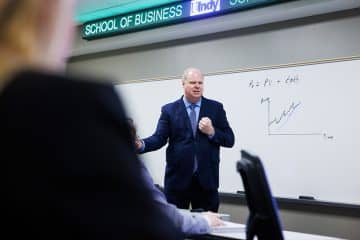How to Find a Better Job After Finishing College?
You went to class, you studied, you put in the work, and you did it! Congratulations on finishing college. Now comes the fun part: finding a better job. Fortunately, as an adult with life and work experience, finding a better job to suit your new degree shouldn’t take too much blood, sweat, or tears. It will, however, take some time, effort, and a lot of patience. Continue reading for tips on how to tailor your résumé, use social media, and craft a personal brand to get you your dream job.
Start your job search:
This might sound obvious; if you’re reading this, you’ve already started your search, right? Yes and no. Just because you’re looking for a job, that doesn’t necessarily mean you’re doing everything you can effectively. With a focused and strategic plan, you will be able to land a job more quickly. If you finished college to advance in the field you’re already in, then you likely already know where to start. If your new degree is opening unfamiliar doors, then take a moment to explore your options. Don’t be afraid to consult the career center at your school; the staff there can help you identify career paths suited to your strengths and goals. Create a list of jobs you’re interested in and qualified for and start exploring.
The early bird gets the worm (and the job):
This adage is especially relevant when it comes to your job search. StartWire, a job search engine, reported that more than 50% of jobs were filled by candidates who had applied within the first week of a posting. Set up a job alert on Indeed, LinkedIn, Glassdoor, or Monster so that you can be notified of every new posting. Of course, if you’re not one of the first applicants, don’t be discouraged. Apply anyway! It doesn’t hurt to try your chances, especially if you have specialized skills.
Tailor your résumé:
It might be tempting to submit your résumé seconds after finding a job posting, but you need to make some changes. It’s common sense that a recruiter will recognize and condemn a generic résumé or cover letter, but in this age of technology and automation, your résumé might not even make it to the discerning eye of a recruiter in the first place. Many companies use recruiting software that automatically sorts through applications that don’t feature the right keywords. To avoid having your résumé fall through the cracks, take the time to make sure it features relevant language from the job posting. Now, this doesn’t mean you should list that you’re a photoshop expert or fluent in Mandarin just because that’s listed in the posting. Rather, look for the hard and soft skills you do have and emphasize them in your résumé and cover letter. You’ll make it past the AI gatekeepers and reach the human eyes of a recruiter.
Create a personal brand:
As unique individuals, we all have a personal brand—it’s called our personality! In the professional world, however, it is important to make sure your brand is clear, distinctive, and uniquely yours. Producing original content like articles, videos, and blogs is a great way to showcase your skills and individuality. It’s also a great way to position yourself as a unique asset to potential employers. This is a step you’ll work on throughout your career and, like a fine wine, will only get better with age. Don’t stress too much about it if you don’t have a sparkly website or portfolio just yet.
Use social media:
Instagram and Twitter aren’t just for Gen Z. As an adult job seeker, you should embrace social media in your job search. In fact, a report by the Society for Human Resource Management found that 84% of companies use social media to recruit. But don’t worry, you don’t need to download every app; research the leaders in your industry and find out what they use. You’ll likely spend most of your time liking and sharing content on LinkedIn or Twitter, but it can vary. Your social media profiles are an extension of your personal brand, so be judicious with what you post. Keep the personal stuff for a private page you share with family and friends.
Pro tip: Make your account private or delete anything questionable.
Prepare for the interview:
As an adult, you’re probably no stranger to job interviews, but it’s still important to be well prepared. Do plenty of research on the company beforehand so you can tailor your answers. Every recruiter will have a different interview style, but you can expect a few commonalities:
General questions: These questions are anything but basic. Thoughtful answers will make you a memorable candidate.
- Tell me about yourself
- What are your strengths and weaknesses?
- Why do you want to work here?
Behavior questions: Be honest and reflective. The recruiter wants to know how you’ll think and act in the workplace.
- How do you handle criticism?
- Tell me about your leadership experience.
- Describe a moment of conflict with a colleague and how you handled it.
Salary/ Career questions: These can be tricky. Do market research and know what you’re worth.
- What salary are you expecting?
- Where do you see yourself in 5 years?
Mind your manners:
Say thank you! Although not required, it is definitely expected. So much so that some recruiters will toss otherwise qualified applications if they don’t receive a note after an interview. Not every recruiter is so harsh, but it’s better to err on the side of polite caution. A thank-you note demonstrates a few things: your interest in the position, your consideration of the recruiter’s time, and your organizational skills. Keep it brief, and send it soon! Remember, you’re not the only applicant, and you should do everything in your power to make yourself stand out until you accept the job offer. And a thank-you note within 24 hours after your interview does just that.
Be patient:
After you apply and interview, the fate of your acceptance is out of your hands. You’ve realistically done everything you can, so all that’s left to do is sit tight and be patient. Finding a better job after college can take a few months, so be prepared to wait. With a focused plan and patience, you’ll be getting ready for your first day on the job in no time.
Good luck on your search! Finishing college is a great step to take toward pursuing a life-changing career. There is so much to gain professionally by going back to school, so rest assured that your job search after school will get you incredible results.
Still considering going back to school? Well, if you’re just starting out or looking for a change, we’re here to help. Abound: MBA narrows down your options and gets you in touch with schools that we can confirm are Accessible, Affordable, Accelerated, and Advanced. Take a look at the schools we trust and find the online program that works for you.





